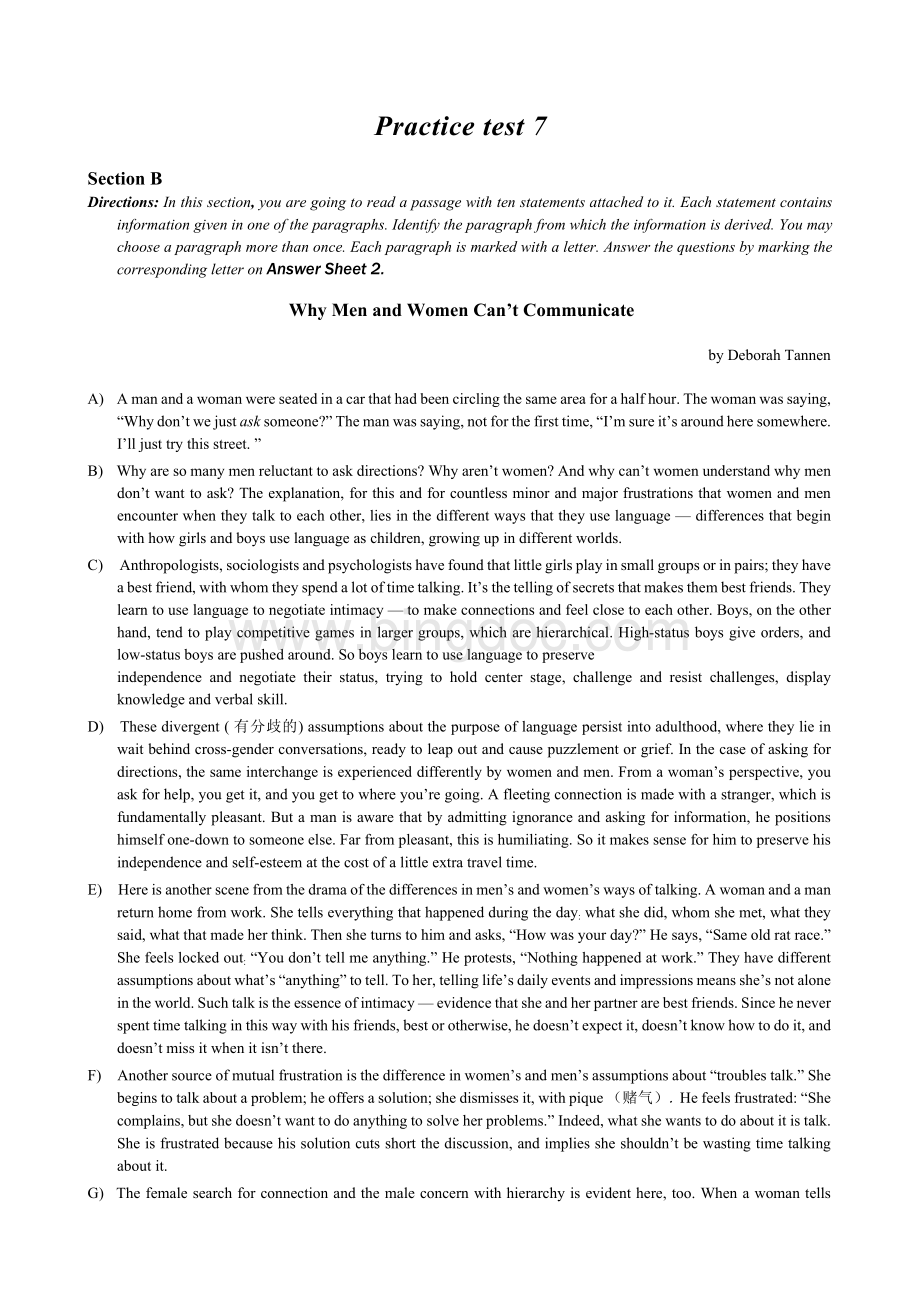英语新题型7.doc
《英语新题型7.doc》由会员分享,可在线阅读,更多相关《英语新题型7.doc(3页珍藏版)》请在冰点文库上搜索。

Practicetest7
SectionB
Directions:
Inthissection,youaregoingtoreadapassagewithtenstatementsattachedtoit.Eachstatementcontainsinformationgiveninoneoftheparagraphs.Identifytheparagraphfromwhichtheinformationisderived.Youmaychooseaparagraphmorethanonce.Eachparagraphismarkedwithaletter.AnswerthequestionsbymarkingthecorrespondingletteronAnswerSheet2.
WhyMenandWomenCan’tCommunicate
byDeborahTannen
A)Amanandawomanwereseatedinacarthathadbeencirclingthesameareaforahalfhour.Thewomanwassaying,“Whydon’twejustasksomeone?
”Themanwassaying,notforthefirsttime,“I’msureit’saroundheresomewhere.I’lljusttrythisstreet.”
B)Whyaresomanymenreluctanttoaskdirections?
Whyaren’twomen?
Andwhycan’twomenunderstandwhymendon’twanttoask?
Theexplanation,forthisandforcountlessminorandmajorfrustrationsthatwomenandmenencounterwhentheytalktoeachother,liesinthedifferentwaysthattheyuselanguage—differencesthatbeginwithhowgirlsandboysuselanguageaschildren,growingupindifferentworlds.
C)Anthropologists,sociologistsandpsychologistshavefoundthatlittlegirlsplayinsmallgroupsorinpairs;theyhaveabestfriend,withwhomtheyspendalotoftimetalking.It’sthetellingofsecretsthatmakesthembestfriends.Theylearntouselanguagetonegotiateintimacy—tomakeconnectionsandfeelclosetoeachother.Boys,ontheotherhand,tendtoplaycompetitivegamesinlargergroups,whicharehierarchical.High-statusboysgiveorders,andlow-statusboysarepushedaround.Soboyslearntouselanguagetopreserve
independenceandnegotiatetheirstatus,tryingtoholdcenterstage,challengeandresistchallenges,displayknowledgeandverbalskill.
D)Thesedivergent(有分歧的)assumptionsaboutthepurposeoflanguagepersistintoadulthood,wheretheylieinwaitbehindcross-genderconversations,readytoleapoutandcausepuzzlementorgrief.Inthecaseofaskingfordirections,thesameinterchangeisexperienceddifferentlybywomenandmen.Fromawoman’sperspective,youaskforhelp,yougetit,andyougettowhereyou’regoing.Afleetingconnectionismadewithastranger,whichisfundamentallypleasant.Butamanisawarethatbyadmittingignoranceandaskingforinformation,hepositionshimselfone-downtosomeoneelse.Farfrompleasant,thisishumiliating.Soitmakessenseforhimtopreservehisindependenceandself-esteematthecostofalittleextratraveltime.
E)Hereisanotherscenefromthedramaofthedifferencesinmen’sandwomen’swaysoftalking.Awomanandamanreturnhomefromwork.Shetellseverythingthathappenedduringtheday:
whatshedid,whomshemet,whattheysaid,whatthatmadeherthink.Thensheturnstohimandasks,“Howwasyourday?
”Hesays,“Sameoldratrace.”Shefeelslockedout:
“Youdon’ttellmeanything.”Heprotests,“Nothinghappenedatwork.”Theyhavedifferentassumptionsaboutwhat’s“anything”totell.Toher,tellinglife’sdailyeventsandimpressionsmeansshe’snotaloneintheworld.Suchtalkistheessenceofintimacy—evidencethatsheandherpartnerarebestfriends.Sinceheneverspenttimetalkinginthiswaywithhisfriends,bestorotherwise,hedoesn’texpectit,doesn’tknowhowtodoit,anddoesn’tmissitwhenitisn’tthere.
F)Anothersourceofmutualfrustrationisthedifferenceinwomen’sandmen’sassumptionsabout“troublestalk.”Shebeginstotalkaboutaproblem;heoffersasolution;shedismissesit,withpique(赌气).Hefeelsfrustrated:
“Shecomplains,butshedoesn’twanttodoanythingtosolveherproblems.”Indeed,whatshewantstodoaboutitistalk.Sheisfrustratedbecausehissolutioncutsshortthediscussion,andimpliessheshouldn’tbewastingtimetalkingaboutit.
G)Thefemalesearchforconnectionandthemaleconcernwithhierarchyisevidenthere,too.Whenawomantellsanotherwomanaboutaproblem,herfriendtypicallyexplorestheproblem(“Andthenwhatdidhesay?
”“Whatdoyouthinkyoumightdo?
”);expressesunderstanding(“Iknowhowyoufeel”);oroffersasimilarexperience(“It’slikethetimeI……)Alltheseresponsesexpresssupportandbringthemcloser.Butofferingasolutionpositionstheproblem-solverasone-up.Thisasymmetry(非对称)isdistancing,justtheoppositeofwhatshewasafterinbringingupthediscussion.
H)Asimilarmismatchofexpectationsoccurswhenawomancomplainsaboutherboss,andamantriestobehelpfulbyexplainingtheboss’pointofview.Sheperceivesthisasanattack,andalackofloyaltytoher.Onemantoldme,incredulously,“Mygirlfriendjustwantstotalkaboutherpointofview.”Hefeelsthatofferingopposingviewsisobviouslyamoreconstructiveconversationalcontribution.Butconversationsamongwomenareusuallycharacterizedbymutualsupportandexploration.Alternativeviewsmaybeintroduced,buttheyarephrasedassuggestionsandquestions,notasdirectchallenges.Thisisoneofthemanywaysthatmenvalueoppositionalstances,whereaswomenvalueharmoniousones.
I)Awomanwashurtwhensheheardherhusbandtellingtheguestsatadinnerpartyaboutanincidentinvolvinghisbossthathehadn’ttoldher.Shefeltthisprovedthathehadn’tbeenhonestwhenhe’dsaidnothinghappenedatwork.Buthedidn’tthinkofthisexperienceasastorytotelluntilheneededtocomeupwithmaterialtoputhimselfforwardatthedinnerparty.
J)Thus,itisn’tthatwomenalwaystalkmore,whilemenaretaciturn(沉默寡言的) andsuccinct(简约的).Womentalkmoreathome,sincetalk,forthem,isawayofcreatingintimacy.Sincemenregardtalkasameanstonegotiatestatus,theyoftenseenoneedtotalkathome.Buttheytalkmorein“public”situationswithpeopletheyknowlesswell.Atameeting,whenquestionsaresolicited(要求)fromthefloor,itisalmostalwaysamanwhospeaksfirst.Whenthephonesareopenedonaradiotalkshow,thevastmajorityofcallsarefrommen,whoaremorelikelytospeakatlength,givingintroductionstotheirquestions(iftheyhaveany)andaddressingmultipletopics.
K)Generalizingaboutgroupsofpeoplemakesmanyofusnervous.Weliketothinkofourselvesasuniqueindividuals,notrepresentativesofstereotypes.Butitismoredangeroustoignorepatternsthantoarticulatethem.
L)Ifwomenandmenhavedifferentwaysoftalking(andmyresearch,andthatofothers,showsthattheydo),thenexpectingustobethesameleadstodisappointmentandmutualaccusation.Unawareofconversationalstyledifferences,wefallbackonmutualblame:
“Yougoonandonaboutnothing.”“Youdon’tlistentome.”Realizingthatapartner’sbehaviorisnothisorherindividualfailing,butanormalexpressionofgender,liftsthisburdenofblameanddisappointment.Surprisingly,yearstogethercanmakethemutualfrustrationworse,ratherthanbetter.After57yearsofmarriage,myparentsarestillgrappling(争斗)withthedifferentstylesIhavedescribed.WhenmymotherreadmybookYouJustDon'tUnderstandWomenandMen,shesaid,“Youmeanitisn’tjustDaddy?
Ialwaysthoughthewastheonlyone.”Understandinggenderdifferencesinwaysoftalkingisthefirststeptowardchanging.Notknowingthatpeopleoftheothergenderhavedifferentwaysoftalking,anddifferentassumptionsabouttheplaceoftalkinarelationship,peopleassumetheyaredoingthingsrightandtheirpartnersaredoingthingswrong.Thennooneismotivatedtochange;ifyourpartnerisaccusingyouofwrongbehavior,changingwouldbetantamount(等于的)toadmittingfault.Butwhentheythinkofthedifferencesascross-cultural,peoplefindthattheyandtheirpartnersarewilling,eveneager,tomakesmalladjustmentsthatwillpleasetheirpartnersandimprovetherelationship.
46.Accordingtospecialists,girlstendtouselanguagetomakeconnectionswhileboys,ontheotherhand,areapttouselanguagetopreserveindependenceandbuildupprestige.
47.Womentendtoregardtalkingasawayofcreatingintimacywhilemenoftenuselanguageasameanstoenhancestatus.
48.Unabletoreachthedestination,thewomanwouldliketoaskfordirectionswhereasthemanwouldrathernot.
49.Failuretoseethedifferencesinconversationalstylesbetweenmenandwomenwillleadtodisappointmentandmutualaccusation.
50.Offeringasolutionputstheproblem-solverinasuperiorposition.
51.Agoodunderstandingofgenderdifferencesinwaysoftalkingmighteventuallyleadtoimprovedrelationshipsbetweenhusbandandwife.
52.Sofarastheuseoflanguageisconcerned,girlsandboysaregrowingupindifferentworlds.
53.Menthinkofofferingopposingviewsasmoreconstructivewhilewomensimplyprefersupportiveresponsetoalternativeviews.
54.Usually,whenawomanstartstotalkaboutaproblem,sheisexpectingtohaveagoodlistenerbutthemanisjusteagertoprovideasolution.
55.Mostmenarereluctanttoaskfordirectionsbecausethemaleegopreventsthemfromadmittingignoranceandaskingforinformation.
Translation
Directions:
Forthispart,youareallowed30minutestotranslateapassagefromChineseintoEnglish.YoushouldwriteyouransweronAnswerSheet2.
80后“啃老族”
最近,针对80后“啃老”现象展开了一项网络调查。
结果显示:
有62%的80后年轻人,承认2年内“啃过老”;有54%的人,预期今后3年内还会继续啃老。
收入低〈年薪多在5万元之下)、物价高、买房压力大,看来是80后“啃老”“名正言顺”的理由。
但记者调查发现,除了频繁跳槽导致经济困顿外,过度消费、盲目使用信用卡、不会理财,也是80后“啃老”的重要原因。
专业人士建议,80后年轻人要养成良好的理财习惯,杜绝信用卡盲目透支;工作“跳槽”也应三思而后行;“跳槽”之前,至少要备足半年的“钱粮”以防“被动啃老”。
注意:
此部分试题请在答题卡2上作答。